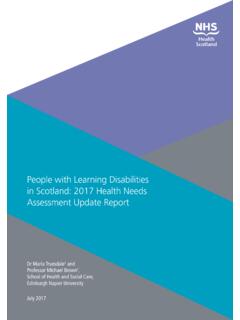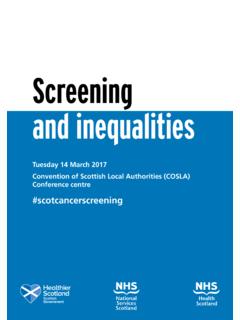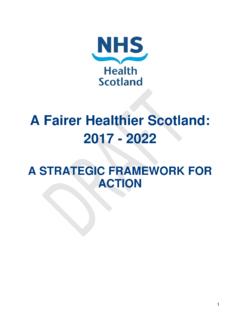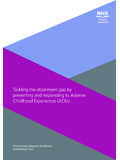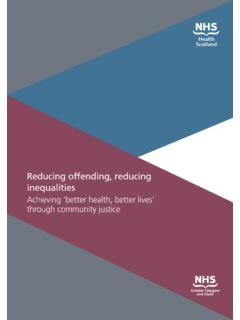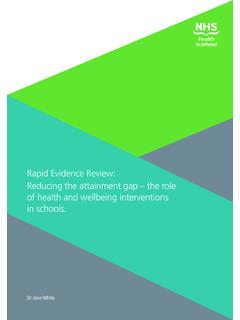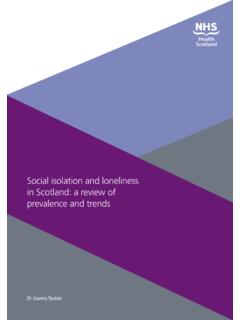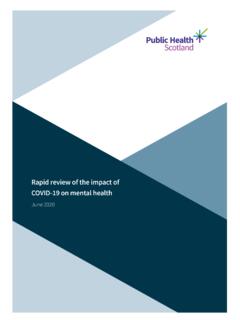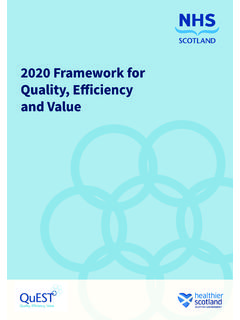Transcription of Health inequalities: briefing 12 Food poverty
1 Food poverty NHS Health Scotland is a national Health Board working with and through public, private and third sector organisations to reduce Health inequalities and improve Health . We are committed to working with others and provide a range of services to support our stakeholders to take the action required to reduce Health inequalities and improve Health . Key messages F ood poverty is preventable. It is a consequence of the socioeconomic and environmental context in which people live. F ood poverty has negative Health and economic outcomes, as well as social and psychological impacts. T he existence of emergency food aid provision reflects the growth of both episodic and chronic severe food poverty .
2 As food bank usage is just one aspect of food poverty , it does not show the nature and the scale of the problem. Key actions T o increase our understanding of the prevalence, nature, causes and consequences of food poverty , we must use recent improvements in measuring and monitoring food poverty . We must also use qualitative data, practitioner experience and community-led research. T he benefits of taking a human rights-based approach to food poverty needs to be better understood and applied, as does the contribution of lived experience and community-led responses. E mergency food provision should not replace, or form an integral part of, an adequate social security net.
3 Inequality briefing 12 Nov 2018 1. A series of briefings to promote action to reduce Health inequalities. What is food poverty /food insecurity? Food poverty is one specific dimension of Clearly and consistently defining food poverty and its related issues presents numerous challenges. The most commonly used terms are often used interchangeably and can be confused or interpreted differently (see page 9). NHS Health Scotland uses the following, widely used,2 definition: The inability to acquire or consume an adequate or sufficient quantity of food in socially acceptable ways, or the uncertainty that one will be able to do so.'3. The more specific term of food security, and household food insecurity (see page 9), is more commonly used in terms of measurement of the scale and understanding the nature of food poverty .
4 How does food poverty affect Health and Health inequalities? Food is an important mechanism linking poverty with Health and social outcomes. It is also a fundamental human right. Not having access to or being able to consume an adequate or sufficient quantity of food has significant consequences for an individual's nutritional intake and subsequent Health and wellbeing. The detrimental impact of poor nutrition on Health outcomes, from malnutrition and numerous non-communicable diseases to psychological wellbeing, underlines the importance of access to and choice over an adequate, well-balanced and healthy diet throughout someone's life. Cultural, social and environmental barriers to eating a healthy diet are associated with socioeconomic status, ethnicity or geographical region.
5 Nutrition-related inequalities ( differences in what people eat across social groups) can affect Health and wellbeing and contribute to wider Health inequalities. The social and psychological consequences of experiencing food poverty , combined with the physical Health costs of an inadequate or uncertain diet, present key challenges when trying to improve Health , reduce Health inequalities and reduce Health costs. 2 Inequality briefing 12. Why do we have food poverty ? Food poverty is complex and multidimensional, with different combinations of factors having an effect on individuals, families and communities. These factors include: income local availability of and access to retailers selling affordable, nutritious food access to transport access to cooking, storage and preparation facilities appropriate food skills and knowledge.
6 As with all poverty , food poverty is primarily driven by income deprivation. Although food choice is influenced by many interrelated factors, in a consumer-driven environment, the importance of food price and having money to buy food are key. Rising living costs, low wages, job insecurity, insecure or underemployment, the low level of social security benefits, and changes to and inefficient implementation of the welfare system since 2012 have impacted the number of people experiencing food poverty . Food price instability and the higher food inflation experienced by poorer households further increases uncertainty around what is As a specific dimension of poverty , food poverty is ultimately rooted in political and social decisions made in our society.
7 A rise in food prices is more difficult for low income households to cope with because those on low incomes spend a greater proportion of their income on food - a rise in food prices has a disproportionately large impact on money available to spend elsewhere Food is exerting greater pressure on household budgets since 2007 when food prices started to rise in real terms.'5. @NHS_HS 3. Who experiences food poverty ? A number of complex and multidimensional factors, such as economic, social, psychological and geographical factors, result in individuals, families and communities experiencing food poverty to different degrees. The experience can often involve sacrifice and dietary adjustments, mothers skipping meals so that their children can eat,6 and compromises on food quality and The experience for some can also involve reliance on family, friends and neighbours.
8 Below are some quotes from studies of food poverty . These reflect the mixture of motivations and emotions felt by individuals and families experiencing food poverty the worry, ingenuity, embarrassment, resilience, frustration and sacrifice. To buy reduced price products may mean low quality or about to expire food. However, this type of food helps to rescue the day. I'm lucky, my family, my mum has helped me out, I've had help, but if I hadn't had that to lean on, basically, I know for a fact, I. would have to have went to a food bank. The finance wasn't coming in enough to heat the house, or it was heat the house or feed the kids and it was torture, I was lucky that my family helped.
9 If I've been at the lunch club I'll probably skip a meal. You don't want people thinking Oh you cannot cope'. So you try to make the effort to cook. I can do it to show folk I'm coping there is nothing to worry about'. When I close the door it's sod it why should I be bothered?'. I quite like to go for a coffee to be sociable. I know I can't afford to do that all the time. It's no just food they need, they need good food to grow. Sometimes you have to sacrifice things for yourself to have good meals so they are getting what they need. Quotes taken from community-led research undertaken by Central and West Integration Network (Glasgow), the Borders Healthy Living Network and Linwood Community Development Trust, supported by Community Food and Health (Scotland.)
10 8. 4 Inequality briefing 12. What is the nature and scale of food poverty /food insecurity in Scotland? Effective monitoring and evaluation are needed to not only better understand the extent of food insecurity in Scotland but also to understand its intensity and the consequences for particular parts of the population in certain circumstances. From 2017/18, questions on household food insecurity, based on the internationally recognised Food Insecurity Experience Scale (FIES),9 have been incorporated into the Scottish Health Survey. No single tool can account for the many dimensions of food and nutrition security; however, it is crucial that a growing body of data is efficiently analysed, complemented with targeted research and used to inform policy responses.
